| J-COM Holdings Co., Ltd. (2462) |
|
||||||||
Company |
J-COM Holdings Co., Ltd. |
||
Code No. |
2462 |
||
Exchange |
Tokyo Stock Exchange, First Section |
||
Industry |
Service |
||
President |
Yasuhiko Okamoto |
||
HQ Address |
Umeda Hankyu Building Office Tower 19F, Kakutacho 8-1, Kita-ku, Osaka |
||
Year-end |
May |
||
URL |
|||
* Stock price as of the close on July 31, 2012. Number of shares at the end of the most recent term excluding treasury shares.
|
||||||||||||||||||||||||
|
|
* Estimates are those of the Company. A 200 for 1 stock split was performed in June 2011.
|
|
| Key Points |
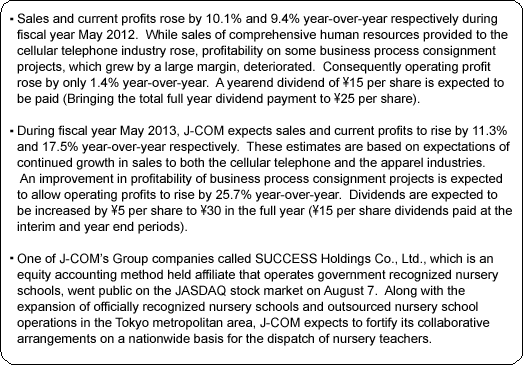 |
| Company Overview |
|
(Strengths and Growth Strategy)
With regards to the provision of human resources services to the cellular telephone industry, J-COM boasts of advantages in its marketing including bountiful knowhow in services provided to the cellular telephone industry across the broad range of business processes, a track record of sales commitments achievement rates for cellular telephones, the ability to interface with customers, and effective inventory control and personnel deployment capabilities. In addition, J-COM also benefits from its strong financial standing (No debt with interest), strict compliance standards implemented as a publicly traded company listed on the First Section of the Tokyo Stock Exchange, and a strong brand recognition.Currently J-COM has achieved successful results in its nursery school and apparel industry services businesses, which are being cultivated to become the second and third pillars of its overall operations. Furthermore in July 2012, the Company launched an employment search support service for Chinese students studying within Japan. (Corporate History)
The roots of J-COM can be found in the travel package company called Powers International, which was established in September 1993. In April 1996, Powers started the operation of a cellular telephone shop, and in November 1996 the Company was renamed as J-COM with a new focus upon the cellular telephone market. In October 1998, the Company began providing human resources services leveraging its experiences to the cellular telephone industry. This steady expansion in the human resources business enabled J-COM to go public on the Mothers Market of the Tokyo Stock Exchange in December 2005, and in February 2007 the Company moved its shares to the First Section of the Tokyo Stock Exchange, achieving the status.J-COM rapidly expanded its earnings through the provision of human resources services to the cellular telephone industry, and four years after its listing on the Mothers Stock Exchange in December 2009 it adopted a holding company structure to more easily cultivate synergies between its various businesses. J-COM will also promote an aggressive strategy of M&A and collaborative business arrangements, as evidenced by the capital participation in SUCCESS Academy Co., Ltd. (Currently known as SUCCESS Holdings Co., Ltd.), which operates government recognized nursery school facilities, nursery facilities in hospitals, corporations and schools in December 2009. J-COM formed a capital and business alliances with TOW Co., Ltd. listed on the First Section of the Tokyo Stock Exchange in February 2010, and acquired 100% of the shares of IFC Corporation, which was a 100% owned subsidiary of Sumikin Bussan Corp. and provides designers and patterners to companies in the apparel industry, in September 2011. In July 2012, J-COM also formed a collaborative business arrangement with the "Chinese Chamber of Commerce in Japan" to provide employment search support and related services to Chinese students studying in Japan. Furthermore, the equity accounting method held affiliate SUCCESS Holdings Co., Ltd. also listed its shares on the JASDAQ Stock Market on August 7, 2012. (Business Segments)
J-COM' s business segments can be divided between the comprehensive human resources services, including human resources dispatch, business process consignment, dispatched worker for employment placement and job placement, and multimedia services including cellular telephone carrier shop operation. During fiscal year May 2012 the comprehensive human resources services business accounted for 97% of consolidated sales.In addition, the comprehensive human resources services business can be divided by various contract categories including dispatch contracts, business process consignment (Processes outsourced to J-COM), and dispatched worker for employment placement and job placement contracts. Each of these categories accounted for 63.1%, 36.6%, 0.3% of segment sales respectively during fiscal year May 2012. By industry, sales to the cellular telephone industry remained high at 91.9% of total segment sales, with sales to the apparel industry growing to 4.8% and telecommunication industry at 2.1%. By geographic region, eastern Japan, western Japan, and Tokai regions accounted for 47.4%, 40.1% and 12.5% respectively.  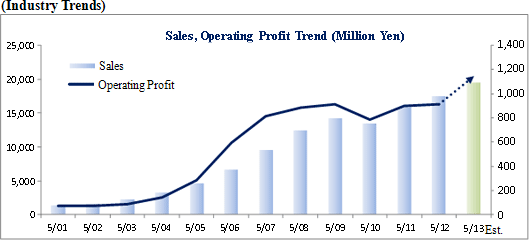 While J-COM was not able to avoid the negative impact of the Lehman Shock and potential revisions in the Worker Dispatch Law (Potentially negative for the entire industry), the heightened need for highly skilled sales staff able to explain the increasingly complicated fee structures and product lineup arising from increasing competition within the cellular telephone industry allowed the Company' s earnings to bottom in fiscal year May 2010. During fiscal year May 2011, a shift in customer needs to an increased reliance upon outsourcing of business processes was followed by the subsequent start of business process consignment services during fiscal year May 2012 by J-COM. However the increased burden upon sales staff associated with the shift to sales of smartphones from feature phones caused profits to fall below expectations. However renewal of customer contracts which were unprofitable is expected to contribute to strong growth in profits during fiscal year May 2013. |
| Endeavors to Expand Businesses |
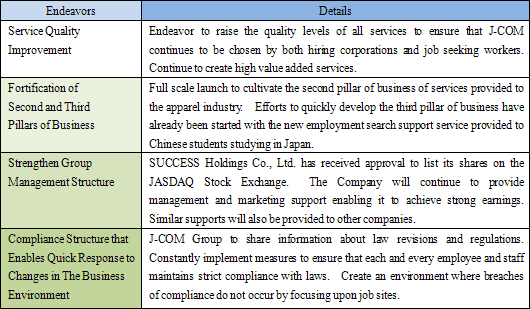 (1) Establish Second, Third Pillars of Business
With regards to the establishment of new businesses to become the second and third pillars of J-COM' s overall operations, the pace of the overall expansion of business is expected to accelerate on the back of the effects of M&A and along with the start of employment search support services for Chinese students studying in Japan.
① Services Provided to Apparel Industry
In addition to services provided to the cellular telephone industry, the services provided to the apparel industry are expected to become the second pillar of J-COM' s business. The breadth of J-COM' s services in this area are expected to broaden with the acquisition all of the shares of IFC Corporation, a 100% owned subsidiary of Sumikin Bussan, in September 2011. IFC boasts of bountiful knowhow and experiences in the apparel industry and a strong track record in the placement of designers and patterners.J-COM Holdings expects sales to the apparel industry to grow rapidly to ¥1.5 billion during fiscal year May 2013. The knowhow and experiences of IFC are expected to allow this business to grow to ¥5.0 billion over the intermediate term. ② Employment Search Support Services for Chinese Students
In July 2012, J-COM formed a collaborative business arrangement with the "Chinese Chamber of Commerce in Japan" to provide employment search support and related services to Chinese students studying in Japan. Among the 110,000 Chinese students studying within Japan, over 60% seek employment opportunities with Japanese corporations. Therefore J-COM seeks to leverage its experiences in the human resources services to provide employment search support services to Chinese students. The "Chinese Chamber of Commerce in Japan" was established to help promote various activities of Chinese living within Japan.
(2) Fortify J-COM' s Group Management Structure
SUCCESS Holdings Co., Ltd., which is an equity accounting method held affiliate that operates government recognized nursery schools, listed its shares on the JASDAQ market of the Osaka Stock Exchange on August 7, 2012. In addition to the operation of 52 government recognized and privately operated public nursery schools, and school aged children' s clubs, SUCCESS Holdings also operates 143 child care facilities within educational institutions, hospitals, and corporations including those at the Tokyo University and Osaka University on a consignment basis. In the future, SUCCESS Holdings will continue to expand the number of both self operated and consignment based nursery schools within the Tokyo metropolitan region where demand is strong (The listing of its shares on the stock market will enable it to access capital to be used to develop certified nursery school facilities). At the same time, J-COM, which dispatches nursery teachers, will strengthen its alliances with nursery schools on a nationwide basis.
 ※ Regarding Revisions in the Worker Dispatch Law
Due to the profound influence of the Worker Dispatch Law, the highly controversial revisions to the law proposed by the Democratic Party of Japan have been diluted with the elimination of the potential bans upon registered worker dispatch and dispatch to the manufacturing industry. The major details of the revision are provided below.
|
||||||||||||||||||||||||
| Fiscal Year May 2012 Earnings Results |
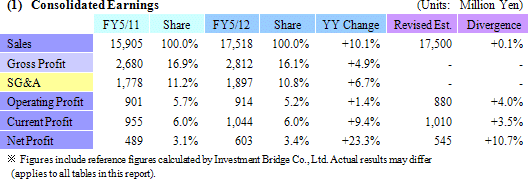 Sales and Current Profit Rise by 10.1% and 9.4%
Sales rose by 10.1% year-over-year to ¥17.51 billion during fiscal year May 2012. By division, sales of the comprehensive human resources services and multimedia services rose by 9.9% and 16.8% year-over-year to ¥16.99 and ¥0.52 billion respectively. Sales to the cellular telephone industry rose by 8.9% year-over-year due in part to the strong demand to purchase smartphones. At the same time sales to the apparel industry, expected to become the second pillar of J-COM' s business, also rose by 2.6 fold year-over-year. With regards to profits, a deterioration in profitability on some business process consignment projects arising from overtime and other unanticipated additional costs caused growth in operating profit to fall below sales at 1.4% year-over-year. However increases in equity in earning of affiliates from ¥10 million in the previous term to ¥57 million in the current term and ¥26 million in subsidy related income contributed to an improvement in non-operating profit and allowed current profit to rise by 9.4% year-over-year. Reductions in tax payments allowed net income to rise by 23.3% year-over-year to ¥0.60 billion. J-COM is expected to pay a dividend at the yearend of ¥15 per share, for a full year dividend payment of ¥25 per share. When the 200 for one stock split performed in June 2011 is considered, the actual full year dividend would be equivalent to ¥5,000 per pre-split share. Actual Profits Exceed Revised Estimates
On April 16, 2012 J-COM issued a downward revision to its initial earnings estimates. And while actual profits exceeded these downward revisions, they still remained below the initial estimates (Sales, and operating and current profit fell by 5.3%, 14.6% and 11.5% compared with ¥18.5, ¥1.07, and ¥1.18 billion respectively). These weaker than expected earnings are attributed to increases in problematic projects, and higher than expected overtime charges of staff due to the increased difficulty of explaining new fee structures and functions of the new generation of cellular telephones. J-COM' s response to this issue of switching from business processes consignment contracts to worker dispatch contracts during the third quarter contributed to a near term declines in both sales and profits. At the same time, improvements in profitability of these projects due to the switch to dispatched worker contracts allowed profitability to improve during the fourth quarter and contributed to the increase in profits over the revised estimates.During fiscal year 2011, the number of cellular telephone handsets shipped rose by 13.5% year-over-year to 42.74 million units. In particular, the number of smartphone handsets rose by 2.8 fold to 24.17 million and grew to account for 56.6% of total cellular handsets shipped (Source: MM Research Institute, Ltd.). This expansion in the market contributed to increased sales activities of various carriers and agencies. (2) Comprehensive Human Resources Services Business Trends
By type of contract, business process consignment related sales rose by a large margin of 26.7% year-over-year to ¥6.22 billion, while dispatched worker related sales rose by 1.9% year-over-year. By industry, sales to the cellular telephone industry rose by 8.9% year-over-year to ¥15.62 billion on the back of the expansion in the smartphone market and aggressive marketing activities of the cellular telephone carriers. The heightened brand recognition within the apparel industry contributed to an increase in the number of client companies and allowed sales to the apparel industry to grow by 2.6 times year-over-year to ¥0.81 billion. By client, business process consignment contracts provided to cellular telephone sales agencies rose by a large margin, while sales to the six cellular telephone service carriers rose by 3.1% year-over-year. By geographic region, sales in eastern Japan rose by a strong 19.5% year-over-year to ¥8.06 billion.
     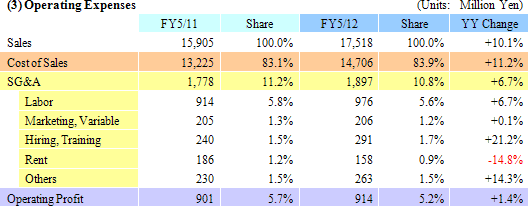 Cost of Sales Margins Rise from 83.1% to 83.9% (Dropped by 0.8 points)
The hiring of staff along with the start of the business process consignment business led to a temporary increase in costs of sales (Note), and higher than expected overtime costs due to intensifying competition within the cellular telephone industry contributed to a worsening of cost of sales margins. However the switch of unprofitable business process consignment contracts to worker dispatch contracts allowed profitability to improve rapidly more than expected after the third quarter.
Selling, General, Administrative Cost Margins Decline from 11.2% to 10.8% (Improved by 0.4 points)
Strict cost controls and efforts to improve the efficiency of operations led to 0.2%, 0.3%, and 0.1% point declines in labor, rent, and variable marketing cost margins respectively. At the same time increased hiring and training activities led to a 0.2% point increase in hiring and training cost margins.
(Note) Cost of Sales Increase Arising from Hiring of Staff In Response to Business Process Consignment Project Orders
In the initial stages of the shift from worker dispatch contract to business process consignment contracts led to deterioration in profit margins because of the need to maintain staff dispatched by other companies on the premises of clients even after the shift to business process consignment contract after projects are won through a bidding process. For example, where business processes are conducted by 20 staff not sent to the client company by J-COM, these staff must be retained and compensated until they quit. But the gradual replacement of these staff by existing staff retained by J-COM will lead to improvements in profitability.
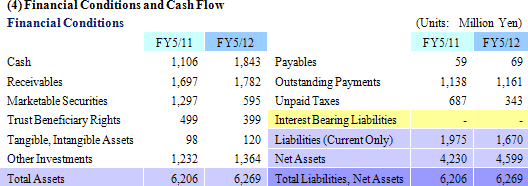  |
| Fiscal Year May 2013 Earnings Estimates |
 Sales and Current Profit Expected to Rise by 11.3% and 17.5%
J-COM calls for sales to rise by 11.3% year-over-year to ¥19.5 billion in fiscal year May 2013. While sales of multimedia business are expected to decline, sales of comprehensive human resources business are expected to rise by 11.8% year-over-year to ¥19.0 billion. This increase is based on the assumption of increases in sales to the cellular telephone and apparel industries. At the same time operating profit is expected to rise by 25.7% year-over-year to ¥1.15 billion based on improvements in profitability of business process consignment projects and expectations of highly profitable orders for special sales campaign projects. J-COM expects to increase its dividend payment by ¥5 per share to a total dividend payment in the full year of ¥30 per share (¥15 dividend payment at the end of the interim and full year periods).
  First Half
The shortage of sales staff is expected to continue in light of the intensifying competition between the various carriers within the cellular telephone industry. The response to unprofitable projects including the direct hiring of staff in business process consignment work is expected to lead to improvements in cost of sales margin.
Second Half
Endeavors to capture projects during the busy sales season and new services targeting the apparel industry are expected to contribute to growth in sales. At the same time profitability is expected to improve due to improvements in cost of sales margins.
|
| Conclusions |
|
Disclaimer
This report is intended solely for information purposes, and is not intended as a solicitation to invest in the shares of this company. The information and opinions contained within this report are based on data made publicly available by the Company, and comes from sources that we judge to be reliable. However we cannot guarantee the accuracy or completeness of the data. This report is not a guarantee of the accuracy, completeness or validity of said information and or opinions, nor do we bear any responsibility for the same. All rights pertaining to this report belong to Investment Bridge Co., Ltd., which may change the contents thereof at any time without prior notice. All investment decisions are the responsibility of the individual and should be made only after proper consideration.Copyright(C) 2012 Investment Bridge Co., Ltd. All Rights Reserved. To see IR related seminars of Bridge Salon, please go to our website at the following url: www.bridge-salon.jp/ |




